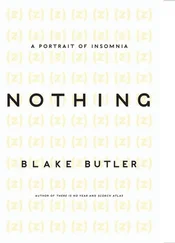If something does appear, among the tapes of nothing, it must be something, one assumes.
Inside the body of the person seeing the milk falls down through fleshy rolls through the center corridor of his or her body to slick and rush along the landscape of the throat, leaving filmic coat along its white way into the stomach, filling the remainder of what is there of what energy has already been destroyed inside the body from aging and production all ongoing inside the walking and the sitting and the sleeping of the body. The milk, one presumes, will be used then by the body to perpetuate the body in forward motion for some amount of future time, making it possible to breathe and sit and eat again sometime and before the screen there employed to see, if, in this instance, to see nothing, as there is nothing there but white, so far.
The body will continue to be changed. At some point in this future today the person will lie down on a bed to sleep again, this time knowing he or she is sleeping, or believing at least that he or she is.
The face of the screen is the face of the nothing through which the nothing functions and can be seen for what it is.
The face of the screen has held many images before today, the image of the white. There have been years of tapes of other persons making motions that will indict their wrong behavior. This is the function of the operation of the viewing in this context: to jail. What is seen that can’t be used in this manner does not exist. One assumes, too, in days forthcoming, after the days of viewing the White Tapes of Gretch Gravey, the screen will be used again for images of other potential malevolence. Color will function in the pixels of the machine’s face to depict persons moving, copied stretches of the sky, perhaps in depiction of some wrongdoing, some destruction, derangement, death; elements possible in any given suspect, if only waiting to awake.
The point is that we don’t know what we’re looking for here. Which is why we’re looking. The evidence may or may not rear its head. There is not always evidence provided toward the nature of our history and how it holds us, feeds us.
He or she sits the milk glass down. The milk glass now is mostly empty, except for where around the inside layer of the glass the milk remains in residue, a thin white lining that reforms its shape as it is placed to set still again on the desk where it had been. The remaining milk not consumed is milk that might’ve been used to perpetuate the function of the body slightly further in its ongoing, if by a negligible amount. It’s really not much milk left in the glass, but it’s not empty. One could extend his or her tongue. One could lick around and use the fingers to get more of the smear of the milk out, but one does not.
One returns to sit back in the padded seat again half slumped at no clear angle in relation to any of the room’s walls, seeing only the walls before the self directly clearly and in some amount of visibility as well those in the periphery on each side. Each present moment’s experience waxes or wanes in or out in quality as the concentration of the person shifts in one way or another for whatever reason. He or she is at just enough of an angle to look like he or she is at attention, sitting up, while also close enough to feel comfortable that the shape allows the nodding off perhaps again, though having slept once and in small fits and now awoken from the longest, he or she is more fully there inside the room, refreshed. Sleep later in the evening even will be harder, having faltered.
Most of the room cannot be seen. Hours continue in the manner of their own becoming.
One looks head-on into the TV. One is watching nothing making nothing; white making white.
The sound is mute. The sound before the TV had been muted was all static, and at first he or she had let the static sound go on, and it had been more than two hours before the mute procedure was applied. He or she presumes that if the nature of the static changes, the nature of the image would also change, and therefore one would not miss any shift inside the sound if it occurs, though if there were a sound now inside the tape that did not correspond with the change of the video, such as a voice, a dictation, someone confessing, someone listing directions for the destruction of the earth, encoding in the head of the hearer a methodology of murder, that sound inside the room would not be heard. The sound would still be played, though, on the tape, into the room; it only would not be noted beyond its own silence. The word, though, would have occurred.
The muted or turned-off TVs in all the other houses surround the building. The white walls surround each room. The light inside the rooms and between the rooms constantly changes.
In the grain of the function of the white, one might see aberrations from what had been actually filmed. One might force, in the seeing, a rub of grain, a flux of multicolor in the nothing that appears to rise and become swallowed in the white. Hours passing in the seeing of the nothing make one’s eyes go weird and grabby, wanting texture where there’s none. The eyes play tricks inside their wishing boredom. He or she has seen, for instance, just now, or, rather, believes he or she has, a kind of lobe or hand rise from the flat, a reaching out of something from the nowhere as if touching, with such thick fingers. He or she shakes his or her head or blinks the eyes hard, and when one looks again, yes, there is only the white: the white returned to fill the space around the rising of the vision of the perceived hand, no longer there. What rises from the white then, in this manner, is not quite fabrication, mental leaking, but more a congealment: it’s not not there, nor is it really . It went on between the viewer and the viewed alone. It could not be repeated in another. Pixels begin to form a portrait of aggregated resolve, like the lakes or field scenes that arise from staring hard into a loose amassment of stray color. Those traps. Those days. Those jokes. The walls here. Your growing hair.
Of the four witnesses employed to watch of the tapes of Gravey over the many shifts of the last several days, none have agreed upon the way they’ve done the seeing. Only one, just now, for instance, has seen the hand. Only this one will admit, furthermore, to have found his or her self wholly summoned at some point into the wide grain of the white, the pure unending white, as if to some awning opening inside the screen there where the light is to become not one flat panel but a crack cut in the middle of the finite hours of the whiteness.
If the others have also seen this, and they might have, they don’t admit it; they might not even know.
But he or she, now, yes even right now again in the updated moment spent between this sentence and the one before it there invoking the name of the now inside the seeing, he or she cannot avoid admitting how he or she can read against the white something else rising, a surface deeper than the TV, and spreading wider. How, if one allows one’s self to keep one’s eyes wide, not shaking off inside the seeing again into a sleep or someone knocking or the ringing of a phone, one might feel as if there in the white they must move forward; the color of it calling without asking for him or her to come forth slow and long into its body, falling not in a way that knocks the head against the screen’s glass or even leaves the body forward in the chair, but moving as if through some mush writhing outward from the film’s virtual center, filling in around the viewer’s head. How, if one allows one’s self, with eyes wide, one might inside the whitened rise of it go in, might enter beyond some sense of self into this hour of the screen’s hold, and there inside it open into somewhere before not found to touch the room, somewhere before this present instant of our index undefined, a product not only of Gravey’s project and that enactment, but the condition of time surrounding only now.
Читать дальше












